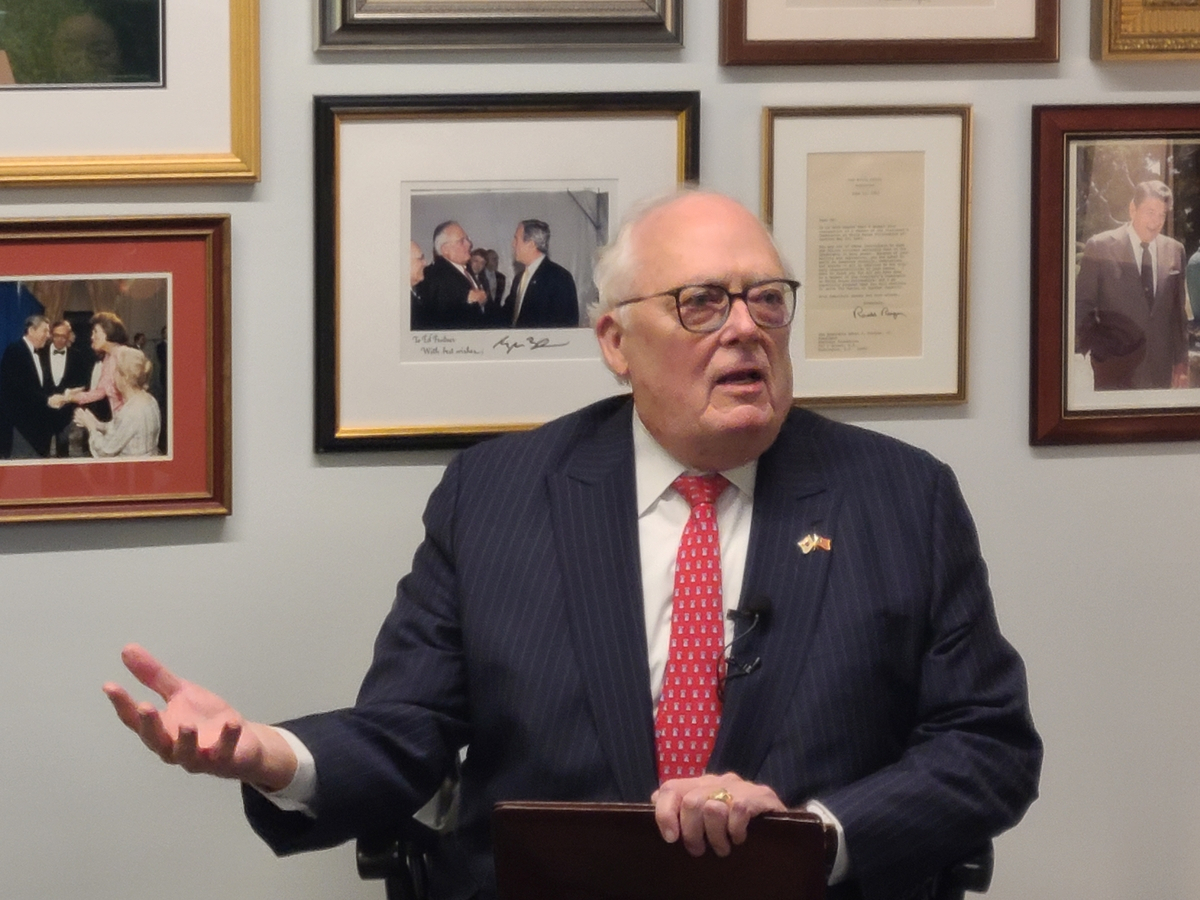 |
Edwin Feulner, founder of the Heritage Foundation, speaks during an interview with South Korean reporters at his office in Alexandria, Virginia, on Tuesday. (Yonhap) |
What a recalcitrant North Korea respects is "strength" and "solidarity," a US think tank founder has said, noting he would advise former President Donald Trump to keep up trilateral cooperation between South Korea, the United States and Japan.
Edwin Feulner, founder of the conservative Heritage Foundation, made the remarks as Trump seeks a second White House term. The think tank has led the development of "Project 2025," a presidential transition plan in the event of a Republican victory in next year's election.
"What North Korea really respects is strength and solidarity on the other side, and that, hopefully, is what he would get from either a reelected Biden or a reelected Trump," Feulner said during an interview with South Korean reporters last week.
He stressed the importance of "strength" as he pointed out past diplomatic efforts did not work.
"One of the things, I think, both administrations -- Trump and Biden -- have learned is that the work of many years of the six-party talks and things like that -- that might have been well-intentioned back when they tried it -- does not work anymore," he said. "It's not going to work."
Feulner was responding to a question about whether there would be a notable change in Washington's approach toward Pyongyang if Trump gets reelected for a nonconsecutive second term.
During Trump's first term from 2017-2021, his administration pursued a direct leader-to-leader engagement with Pyongyang, which led to the three bilateral talks between Trump and North Korean leader Kim Jong-un -- one in 2018 and the others the following year.
Noting Pyongyang's unceasing focus on its weapons of mass destruction programs, Feulner said the direct engagement with the headstrong North Korean leader did not prove to be a viable solution.
"I think, President Trump, if he comes back, will have learned his lesson that you don't just think that somehow, a bilateral relationship with Kim Jong-un is going to help solve the problem because clearly it didn't," he said. "I think clearly it won't in the future."
Feulner described the closer trilateral relationship between Seoul, Washington and Tokyo as a "very positive thing," which he said Trump should build on if reelected.
"In terms of the trilateral relationship, I hope and I will encourage candidate Trump to build on where we are now," he said.
He also praised other cooperation platforms, including the AUKUS grouping involving the US, Britain and Australia, and the Quad forum consisting of the US, Australia, India and Japan -- groups that the Biden administration has pushed to nurture.
Feulner struck a positive note on improvement in bilateral ties between Seoul and Tokyo, long strained over historical issues stemming from Japan's 1910-45 colonization of the Korean Peninsula.
"He (Trump) will now have to deal with the new closer relationship between Korea and Japan, which is, I think, very much a strength in terms of the trilateral relationship," he said. "If the two of you can get along better, it's much better for us as well."
Touching on growing voices in South Korea in support of nuclear armament against North Korean threats, Feulner said, "That's not necessary."
"But I think it's a good thing to talk about to remind North Korea that they are isolated, that the US has the ROK's back and will have it whoever's in the White House, and that the US, the ROK and Japan are closer together than they have been at any time in the past to add and multiply."
ROK stands for South Korea's official name, the Republic of Korea.
Addressing a question about whether weaknesses in the US' global leadership has led to the rise of Russia and Iran, Feulner recalled America's chaotic withdrawal from Afghanistan in 2021.
"I was very depressed in early September of the first year of the Biden administration in 2021 because of the awful way that the US pulled out of Afghanistan, leaving friends, allies and even dual national citizens behind in Afghanistan," he said.
"To have left that way, I think, was a disgrace to the US reputation into the whole willingness for other people to trust us around the world," he added.
Feulner then raised the question of whether it became more likely that Russia would have the nerve to carry out what it did against Ukraine.
"I think it was frankly. I think it was more likely because of what had happened in Afghanistan that he was willing to do that," he said. "If that had not happened, would Hamas have had the nerves to do?"
Feulner served as president of the Heritage Foundation from 1977 to 2013. From 2017-2018, he worked as president again on an interim basis. He also worked as part of Trump's presidential transition team. (Yonhap)







